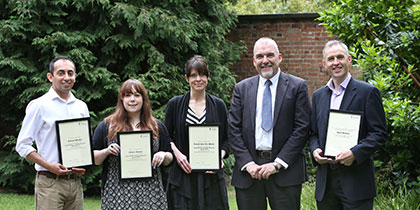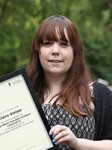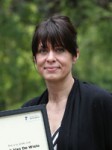June 29, 2015, by Teaching at Nottingham
PGR Teaching Awards 2015
Postgraduate Teaching Award 2015

Ashish Bhalla, Claire Vintern, Tarah Van de Wiele (winners), David Burns (Professional Development) and Nick Barker (Highly Commended).
The Postgraduate Teaching Award is an annual award to recognise and celebrate examples of innovative teaching and support of learning.
In 2015 there were 3 winners who each received a framed certificate and a £100 voucher. Due to the high calibre of applicants, an additional two received a “Highly Commended” certificate.
Winners
 Ashish Bhalla: Ash is a qualified surgeon studying for a PhD and he mainly teaches medical students. This includes bed side teaching, workshops and lectures. Following student focus groups he started to develop vodcasts – video podcasts. He then created a Facebook page and YouTube channel for these vodcasts. Each vodcast covers specific learning objectives for the Medical School modules and are reviewed by a specialist before being released. Over 1000 have been downloaded so far. Ash’s reference indicates that he has designed and delivered innovative and very well received teaching and e- learning. He is easy going, inclusive and has a sound knowledge base.
Ashish Bhalla: Ash is a qualified surgeon studying for a PhD and he mainly teaches medical students. This includes bed side teaching, workshops and lectures. Following student focus groups he started to develop vodcasts – video podcasts. He then created a Facebook page and YouTube channel for these vodcasts. Each vodcast covers specific learning objectives for the Medical School modules and are reviewed by a specialist before being released. Over 1000 have been downloaded so far. Ash’s reference indicates that he has designed and delivered innovative and very well received teaching and e- learning. He is easy going, inclusive and has a sound knowledge base.
 Claire Vinten: Claire teaches in the School of Veterinary Medicine and Science in small group sessions, practicals, problem based learning and in clinics. Claire developed a ‘Decision Diary’ for students to use when on placement with a vet. They used this to help them access and record decisions made by the vets. To evaluate the decision diary Claire got together a focus group. They indicated that the size was impractical and it wasn’t flexible enough, so the format was changed to an online form. Further feedback was very encouraging. Claire has also developed and trialled a simulation session to help students learn the breadth of skills required when consulting. These sessions are now held within veterinary practices and students have several attempts at consulting to learn from their mistakes. Feedback has been extremely positive.
Claire Vinten: Claire teaches in the School of Veterinary Medicine and Science in small group sessions, practicals, problem based learning and in clinics. Claire developed a ‘Decision Diary’ for students to use when on placement with a vet. They used this to help them access and record decisions made by the vets. To evaluate the decision diary Claire got together a focus group. They indicated that the size was impractical and it wasn’t flexible enough, so the format was changed to an online form. Further feedback was very encouraging. Claire has also developed and trialled a simulation session to help students learn the breadth of skills required when consulting. These sessions are now held within veterinary practices and students have several attempts at consulting to learn from their mistakes. Feedback has been extremely positive.
 Tarah Van De Wiele: Tarah is studying for a PhD in the Department of Theology and Religious Studies. She uses audio visual learning aids in the classroom to facilitate student discussion, maintain her students’ interest and immerse them into historical events. Tarah also uses a resource blog with a calendar to notify students of what material they should be introducing or reviewing; this can be uploaded onto their phones and helps to keep them on track and organised. She has also changed the module assessment from being a final coursework essay to short critical essays based on the weekly seminars. Tarah fed back each time areas where students could improve and as the semester advanced marks improved.
Tarah Van De Wiele: Tarah is studying for a PhD in the Department of Theology and Religious Studies. She uses audio visual learning aids in the classroom to facilitate student discussion, maintain her students’ interest and immerse them into historical events. Tarah also uses a resource blog with a calendar to notify students of what material they should be introducing or reviewing; this can be uploaded onto their phones and helps to keep them on track and organised. She has also changed the module assessment from being a final coursework essay to short critical essays based on the weekly seminars. Tarah fed back each time areas where students could improve and as the semester advanced marks improved.
Highly Commended
Olu Amodeni, Nick Barker and Angela Martinez Dy: Olu, Nick and Angela teach a large group in the Business School. To increase student engagement and learning they ‘flipped the classroom’. To do this they produced a video to introduce themselves and the course and made it available on Moodle prior to the first lecture. They also produced another video prior to a content-rich lecture. They used a digital discussion platform for the students to interact with the lecturer and group and utilised videos, clickers and interactive worksheets in the sessions. Before each lecture the students had pre-lecture preparation; the traditional 1 hour lecture was then replaced by a 20-30 minute lecturette and activity sessions. These flipped sessions resulted in students asking more questions and staying better engaged in the lectures. Feedback has been very positive.
Stephen Nutbrown: Stephen is a PhD student in Computer Science, is a demonstrator on programming modules and is also involved in assessment. Stephen regularly posts on a Moodle help forum for programming and responds quickly to students’ posts to help them learn. Their programming assignments were previously marked by hand which was very time consuming and delayed the feedback. Stephen has created a system that automatically marks several parts of the submissions and checks that the correct files are submitted. Pre-submissions allow early feedback, reassurance for the students that their work is correct or the opportunity to learn from their mistakes. Stephen has also written short tutorials for common mistakes, these link the student to the learning materials and good/bad examples. These interventions have resulted in 35% fewer convention mistakes in exercises.
PGA Teaching Awards 2016
The award for next year will be publicised in early 2016.
Applicants may support teaching and learning through a wide range of activities, including: demonstrating in laboratory classes, distance learning, leading seminars or tutorials, supporting project work, lecturing or assessing and giving feedback on student work. Postgraduate research students and research-only Postdocs who teach, either individually or as part of a group, are eligible to apply.
These awards are given to people who can show innovative and reflective practice by:
- Improving effectiveness in their teaching and support of learning
- Making appropriate changes in learning activities or techniques
- Evaluating and reflecting on the impact of their intervention and possibilities for further development
For further details please contact Helen Cowley in Professional Development.
No comments yet, fill out a comment to be the first

Leave a Reply